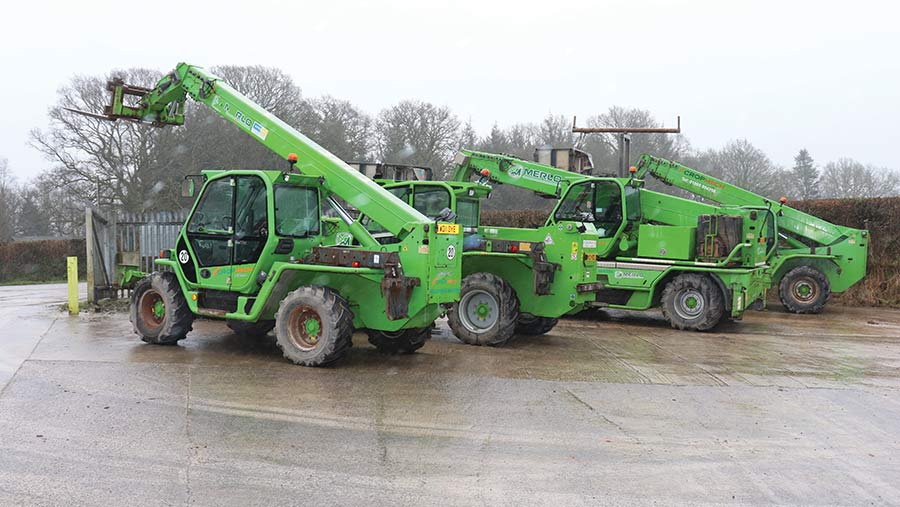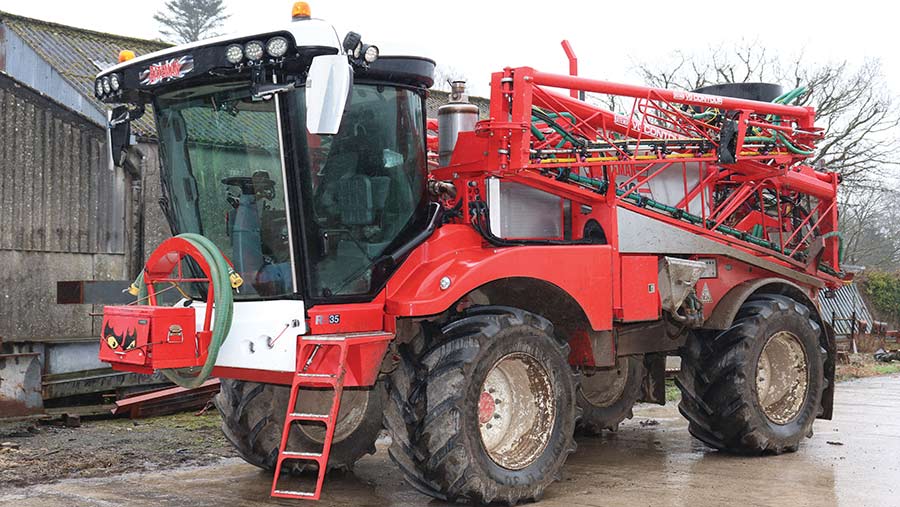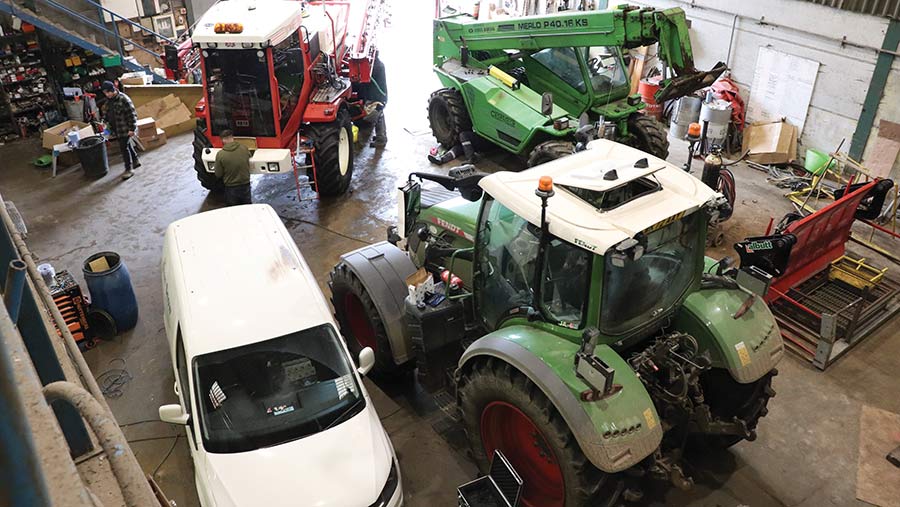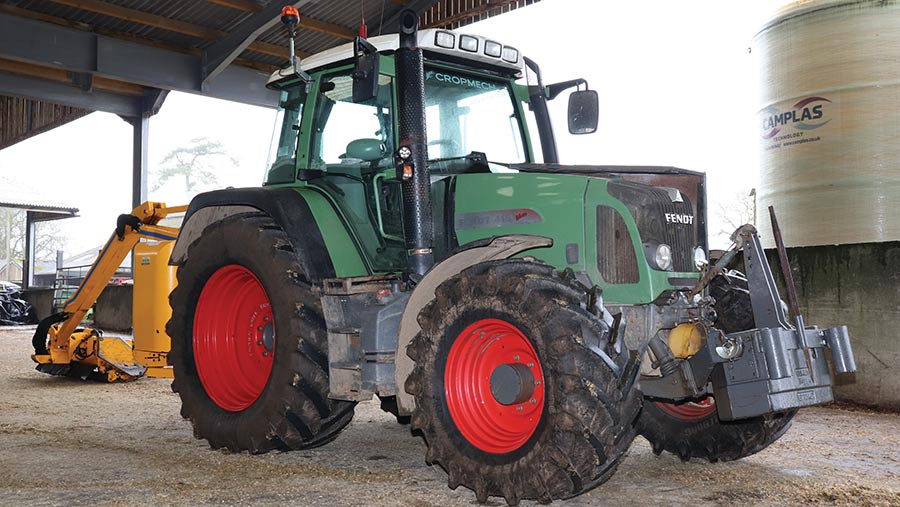Contractor Comment: Interest rates a threat for Cropmech
 © Andrew Faulkner
© Andrew Faulkner For this year’s Contractor Comment it’s all change, as we visit a fresh batch of four contracting firms located in different regions of the UK.
Second up is our new contributor from the South West, Cropmech, which is run by son-and-father team, Elliot and Mark Stevens.
See more: Contractor Comment – beet lifting headaches in the Borders
About the contractor

Mark and Elliot Stevens’ Cropmech business provides mainstream agricultural services, haulage, and telehandler hire from its base in Okehampton, Devon.
Q How did you get into contracting?
Elliot: I’ve never known anything else. My father, Mark, started the business with just an ATV and a sprayer straight after leaving Seale-Hayne agricultural college in the late 1980s.
He steadily increased the spraying area, until his big break came in 1995 when he got into share farming with Clinton Estates on 550ha at Huish Barton. This is where I grew up and is still the business’s base today.
After school I opted for a university access course at Harper Adams as an alternative to A-levels, followed by a year out working and then back to Harper to do a degree in agricultural mechanisation.
Course highlight was the sandwich year on a 17,000ha farming operation in Romania for Cambs-based Spearhead International.
I loved it… to the extent that I almost headed back east after college in 2015. But the business at home was growing fast, and father was keen for me to get involved. Nine years on, I’ve no regrets.
Today, I manage the farming, contracting, telehandler hire and 50% of the crop storage, while father oversees the haulage, the rest of the crop storage, grain marketing, feed blending and other parts of the business.
Business facts
Cropmech, Huish Barton, Merton, Okehampton, Devon
Main services: Maize and grass silage (1,820ha), combining (1,100ha), spraying (14,000ha), square baling (15,000 120x70cm bales), lime spreading (10,000t), drilling (2,000ha), straw processing (650 hours)
Other: 800ha farming (share, contract, farm business tenancies (FBTs)); 15-strong haulage fleet; telehandler hire; grain storage/marketing (60,000t); grain sampler sales
Staff: 12 full-time (farming), plus another 26 (other parts of the business)
Q Main contracting enterprises today?
Although we’re now farming around 800ha in our own right under a variety of agreements (share farming, contract farming and farm business tenancies including 200ha near Swindon), along with expanding the other elements of the business, this was all built on contracting. Everything is interlinked.
The vast majority of the machines will work on our own land as well as carry out traditional contracting for our 150 regular customers within a 25-mile radius of the base at Merton.
We offer the full range of arable operations, from cultivations to combining, and also provide a complete foraging service.
In addition, we spread over 10,000t of lime every year and clock up more than 650 hours with a Hay Buster straw processor.
Q Any forms of diversification?
Telehandler hire, crop storage/marketing and haulage are the main diversifications, although we’ll look at anything that presents an opportunity and is a good fit.
For example, we’ve been the UK distributor for Italian-built DV grain samplers for the past 10 years and have units installed on farms, stores and mills throughout the UK and Ireland.
Focus for the telehandler hire is the provision of manned high-lift machines (up to 26m) for National Grid work in the South West, and they also go out as self-drive units for the build-up of music festivals such as Glastonbury.
On this work, the machines are generally only idling and hardly get through any fuel — very different to flat-out farm work.
We’ll also use the high-lift handlers to put up our own bulk storage buildings on the company’s three main sites at Huish Barton, Risdon Mill and Petrockstowe, where we can now accommodate up to about 60,000t of materials such as grain, straights, lime and wood chip/pellets.
We store and market grain for local farmers, and we also blend 40,000-50,000t of animal feed for Mole Valley Farmers.
Haulage-wise, we’re running 15 of our own trucks — bulkers, low loaders and blowers — plus two sub-contractors, but we hope to increase the operator’s licence to 25 vehicles in the next few months.
We’re receiving a growing number of enquiries for the haulage of slurry and digestate, so the plan is to invest in a 30,000-litre tanker to meet this demand, as well as transporting the product to our own farms, often on muck-for-straw deals.

© Andrew Faulkner
Q Most profitable contracting enterprise?
Ironically, father’s first enterprise, fertiliser spreading, is right up there, along with jobs such as spraying.
The more profitable operations tend to be the ones with fewer wearing parts and where the engines aren’t working hard.
One exception is straw processing with the Hay Buster. Despite using up to 40 litres of diesel an hour, the machine’s ability to work all year round, irrespective of the weather, makes it a decent earner.
The reality is that most operations look profitable on paper when the sun is shining, and it’s all going well.
Q Least profitable contracting enterprise?
There are a number of jobs that we do for strategic reasons, either because we need to offer the services, or they fit in well with our own farming operation. Ploughing is a good example.
Our rate is £80-£85/ha, which still isn’t enough sometimes when you’re in awkward-shaped, small fields.
There are some charging as low as £60/ha. And that’s fine. But I won’t chase the work, as we’ve got plenty of our own ploughing to do.
Q Biggest threats to your business?
It’s the usual issues – the rising cost of machinery, seed, fertiliser and sprays.
Yet interest rates are possibly the biggest concern.
Although we’re looking to rein in our annual investment after a period of rapid growth, we’ll still average £1.5-£1.7m/year across all the businesses on tractors, equipment, trucks and buildings.
The level of outstanding debt is also an ongoing concern; even more so when interest rates are on the rise.
When you’re owed up to £1m, it tends to affect your approach to re-investment.
As one example, we probably should be replacing the 11-year-old Kemper maize header, but at a cost of £100,000 we’ve decided to spend a bit on the existing one instead.
Q Difficulties with staff recruitment?
We’ve been lucky here and have a really good core team across all the businesses. If we do have to recruit we’ll use Facebook and 4XtraHands, but word-of-mouth is as effective as anything else.
In this area, there’s also been a recent shift in the workforce marketplace, perhaps down to the heat going out of the building trade and some hauliers cutting back.
Over the past few months, there’s been a definite increase in the number of people approaching us for jobs.
Q What excites you about the season ahead?
Actually being able to travel on the land after what’s been an unbelievable winter.
On the work front, I expect to see a lot of change over the next two-to-three years. And change is always exciting.
The business has expanded because we haven’t been too rigid about where we’ve taken it… we’ve gone with the flow.
The Sustainable Farming Incentive (SFI) is already having an impact, with more requests for overseeding herbal leys and establishing winter bird food as just two examples. The direct drills will be particularly busy this spring.
If landowners can get £700-£800/ha on SFI as an alternative, there’ll be pressure to increase farming rental agreements. But SFI is far from free money.
There are significant establishment and maintenance costs to factor in.

© Andrew Faulkner
Q New machines in 2024?
After swapping in four of the five Fendt 724s and the 828 in 2023, we’ve just done the one tractor in 2024 – a New Holland T7.210 with 1,000 hours for our 2013 New Holland T7.200 with 9,500 hours.
Cost to change was about £6/hour so it was a bit of a no-brainer, especially when compared with 724s at a cost to change of £14/hour.
Clearly, we’re not comparing like with like on spec, but the New Holland is fine for general jobs such as hauling trailers… and we don’t get paid any more for turning up with a Fendt.
As for other kit, the main new additions for 2024 will be an MF 2234 120x90cm big baler, an Amazone Precea 6000-2CC maize drill with fertiliser placement, another 4m wide Kuhn power harrow drill combination and a Kramer KT559 telehandler to replace the Merlo P55.9-CS in the grain stores.
We’d like to upgrade the maize header and some of the older high-lift Merlo hire machines, but they’ll have to wait.
There’s no rigid replacement policy, although we’ve tended to change the tractors at three to five years. However, this interval is now starting to stretch.
The latest Fendts were done on three-year HP agreements with 6,000-hour warranties, and they’ll average 1,500-2,500 hours/year.
Q Recent major repairs/breakdowns?
Nothing too major at the moment. As mentioned, we’re currently refurbing the Kemper maize header as well as going through the combines.
In the past we’ve been sorting the combines in a rush right up to harvest, so I was determined to get them done earlier this year.
Q Overwinter projects?
Straw processing goes on through the winter, and other than that, we’ll do a bit of hedgecutting when conditions allow on our own ground.
What I won’t do is go chasing extra winter work just to keep wheels turning. If the job’s not profitable, I’d rather leave the machine parked up.
Most winters we’ll be busy putting up a new shed, maintaining machines or occasionally some of the farming staff will switch to operating the hired-out telehandlers.
Q Current contractor frustrations?
The frustrations remain much the same – the difficulty of achieving an affordable rate for the customer while still leaving enough margin for the contractor, and the level of late payments/debt.
Most of our regular customers are dairy farmers, and on the whole they’re pretty good.
But they’re suffering from the lower milk price, higher input costs and, like everyone else, the phasing out of BPS. There’s no easy solution.
We remain optimistic, though. We’re still looking to expand and are open-minded about the direction that takes us.
Kit list

© Andrew Faulkner
Tractors Fendt 828, 724 (x5), 415, New Holland T7.210, T6.180
Combines New Holland CR9.90, Claas Lexion 750TT and Lexion 550
Forager Claas Jaguar 860
Handlers JCB Loadall 536-60, mixed hire fleet (Merlo, Dieci and Kramer)
Sprayers Bateman RB35 (24m/4,000-litre), RB26 (24m/3,000-litre), RB16 (24m/2,500-litre)
Drills 3m (x2) and 4m combination drills, Erth overseeder, 4m Kuhn SD4000 direct drill, 6m Kuhn air seeder, four-row Samco maize drill (plastic), eight-row Amazone Precea 6000-2CC maize drill (with fert)
Main other kit MF 2260 baler, rakes (x2), 9m triple mower, lime spreaders (x2), straw processor, ploughs (x3), fertiliser spreader, slurry tankers (x2) and assorted trailers

